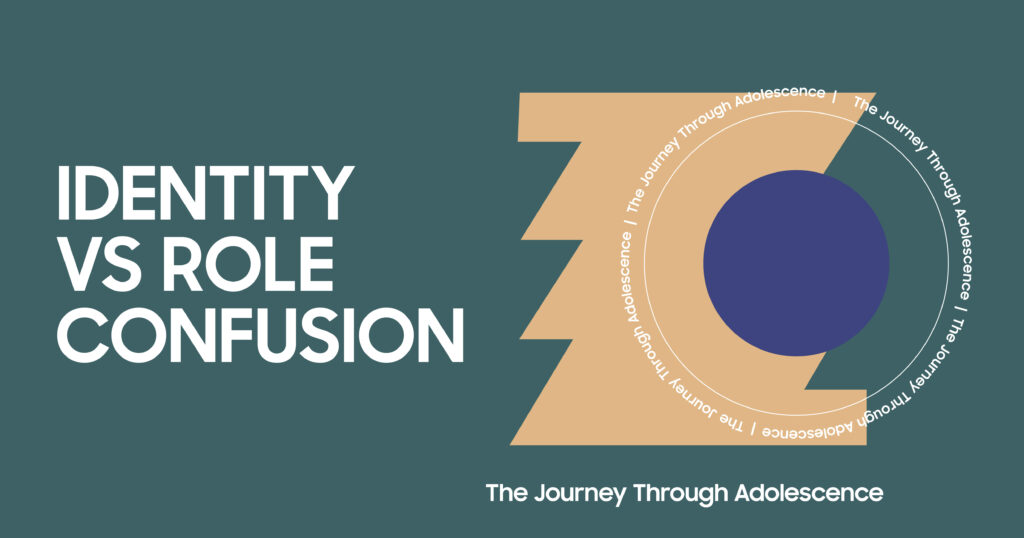According to the psychosocial development theory described by German-American psychoanalyst Erik Erikson, every person is going through eight stages of personality development. The identity vs role confusion stage takes place when the individual is a teenager, and their main goal is to become aware of who they really are and find their purpose in life. But how does this stage of personal development affect them during adolescence and adulthood? And what factors play a major role in the teenager’s personal growth?
In this article we will take a look at what contributing factors impact a teenager in a positive and negative way and discuss the importance of peer interaction and parental influence during the teenage years.
The Foundations of Identity Formation in Adolescence
Adolescence is the time when you explore new things and commit to newfound values. While you continue to strive for connectedness, you also learn to be independent – studies confirm that the identity of a teenager is shaped by their own point of view instead of the opinions of adults around them. You pursue diverse interests, experiment with social groups, your appearance, and personal style, express commitment to certain goals and values whether they are related to your future career, religion, or social affiliation, and adopt behavioral patterns after communicating with people you like and respect.
Role Confusion and Its Impact on Teen Development
Role confusion occurs when you cannot establish a clear sense of identity. If you are not certain about your place in the world, if you cannot commit to lasting relationships, or if your self-identity is disrupted by mental health issues that often manifest for the first time during adolescence, it will affect you going forward.

Even if a teenager is saying they do not care about such banal things, every young person is looking for stability, meaningful connection, and especially support. When you are young and transforming into an adult, you keep relying on others yet hope to gain independence which makes it challenging to develop a coherent and stable sense of identity.
Key Influences on Adolescent Identity
There are certain variables that shape a person’s social identity and sense of self:
| Influence | Description |
| Relationship With Parents | In case you were raised by involved parents who gave you an opportunity to feel supported and stay independent, you can manage your emotions with ease and exhibit appropriate behavior |
| Relationship With Friends | It is not uncommon that people who have been friends since first grade drift apart – their identities go through a major change, they belong to different peer groups, and the peer pressure exacerbated by social media makes it difficult to connect with people your own age |
| Hobbies and Activities | If a teenager is able to participate in extracurricular activities and is encouraged to be a part of their community, explore new interests, and communicate with others, they can develop a sense of belonging much earlier |
| Mental Wellness | It is easier for a person without a mood disorder or mental health condition to adapt to new circumstances, grow, and develop – if your mental well-being is at risk, it is hard for you to have a high self-esteem and connect with new people with confidence |
Cultural and Social Factors Shaping Identity
| Cultural Factor | Description |
| Values of the Family and Community | The traditions of the family unit you grew up in will change the way you see the world especially if you come from a family of immigrants or your community does not encourage communication with people who are different from you |
| Religion | If your childhood has been shaped by religious practices and beliefs, your identity will be influenced by them for years to come, and it may be complicated to relate to people whose religious views are different from yours as well as individuals who come from secular households |
| Heritage | Your ethnicity and nationality often define who you are even if your goal has always been to assimilate and avoid standing out from the crown. The history and language that has been passed down from generation to generation make you unique and special |
| Social Factor | Description |
| Peers and Friends | People who are roughly your age and who go to school or college with you will challenge or reinforce your self-perception – they often serve as role models and provide guidance when you cannot talk to parents about certain concerns and plans |
| Social Media | In today’s fast-paced world, most people draw inspiration and motivation from social media – they are brave enough to explore their own identity, try to be a part of social trends, and present themselves online to feel like they belong especially if they failed to do so in real life |
| Geographical Location | Even though your heritage, ethnicity, and language will impact your identity, the region where you live can expose you to diversity which is so crucial for a developing mind. You can feel connected to a certain area and lifestyle simply because you grew up there and attach yourself to a city or country which will change the way you perceive yourself and others |
The Role of Family and Peers in Identity Development
Your parents, immediate family, and sometimes even distant relatives will provide you with the foundational values to shape your sense of self and the core values you will adhere to during adolescence and even adulthood. Mothers and fathers are the ones who you spend the most of your time with as a kid and teenager, so it makes complete sense that the feedback from them, their support or lack thereof, and the norms and expectations they communicate will play a key role in the development of your identity.
As for your peers, they often offer you a platform for validation, experimentation, and exploration you may not have in your household, especially if your parents were strict or you had to conform to cultural and religious norms you did not feel compelled to follow. You can change your behavior with minimal negative consequences, develop empathy as you communicate with your first ever friends, and try to fit in as you align the values you already have with the beliefs a particular social group holds.

Learn Strategies for Supporting Adolescents at Treat Mental Health
If you are a parent of a teenager who is struggling to find their place in the world or you are a young adult who is trying to explore the world and deal with obstacles on their way in the healthiest way, it is a good idea to rely on mental health professionals who can guide you during tough times.
Contact Treat Mental Health today – our team is ready to hear you out, aid you as you address the problems that contribute to your distress, and make sure everyone in your family feels valued and understood.
FAQs
How does adolescence contribute to self-discovery and personal development during Erikson’s identity vs. role confusion stage?
Young people wrestle with their feelings during this stage – they try to figure out their place in society, they explore new values and beliefs, and they keep asking questions that require clear and straightforward answers otherwise their personal development may be stunted.
What role does peer influence play in shaping social identity during the adolescent years?
Peer influence and especially peer pressure are of paramount importance to teenagers – they will change and adapt their attitudes, behaviors, and actions in accordance with behaviors and principles exhibited by their close friends and classmates in order to feel like they belong and to have social support during these formative years.
How can an identity crisis during adolescence impact one’s sense of self and personal development?
When you are going through a period of intense questioning and self-introspection, it can yield positive results or lead to mental health problems down the line. This is why you should rely on your family members, friends, and adult role models such as teachers and mentors to figure out how to set healthy boundaries in relationships, make the right decisions, prevent emotional burnout and fatigue, and avoid social isolation.
What are Erikson’s stages of development, and how do they relate to identity formation in adolescence?
There are eight stages – trust vs mistrust, autonomy vs shame and doubt, initiative vs guilt, industry vs inferiority, identity vs role confusion, intimacy vs isolation, generativity vs stagnation, and integrity vs despair. As you can see, each stage is characterized by confrontation and resistance which is not necessarily bad especially when your identity is still forming – look at challenges as if they were opportunities, expand your horizons, and remember it is normal to commit and recommit to constantly changing aspects of your identity no matter how young or old you are.
How can adolescents overcome challenges in forming a stable social identity?
By constantly exploring new ideas, points of view, and activities, learning how to present themselves to society with confidence and positivity, and breaking free from values they do not relate to, any teenage person can create their own path in life.








